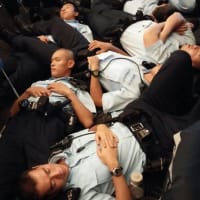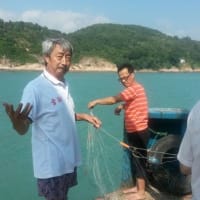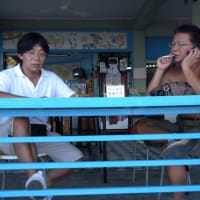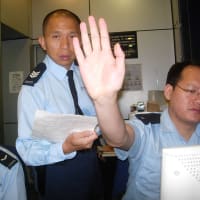> 新華社の英語版探しにいったら、それとは別ですが、コンナ
> のもあった。アフガンの人々はBBCやVOA(ヴォイス・オブ・
> アメリカ)が民間人の犠牲をちっとも放送しないのに失望し、
> 人気が急速に落ちているというニュース(アフガンでそんな
> ん聞けるとは知らんかった)
>
> BBC, VOA Losing Popularity in Afghanistan: AIP
> (新華社 英文版 2001.10.18 14:23:37CHT)
> http://news.xinhuanet.com/english/20011018/463522A.htm
本日23日付けのおなじみ英紙ガーディアンの記事ですが、テレビや音楽などを禁止したタリバンもラジオだけはしなかったらしい...イヤ出来なかったらしい。
A long way from Ambridge
(Guardian 2001.10.23)
http://www.guardian.co.uk/waronterror/story/0,1361,579231,00.html
記事の写真は、94年BBCが開始したアフガン版ソープオペラの放送に耳を傾ける男性。今では(攻撃開始後も?)国民の70%以上(タリバン兵士含む)が夢中になっているとか。恐るべし、不謹慎帝国イギリス。
...ちょっと待て。ラジオもダメ、TVもダメな私よりよっぽど最新事情に詳しいのか、アフガン人!?
> のもあった。アフガンの人々はBBCやVOA(ヴォイス・オブ・
> アメリカ)が民間人の犠牲をちっとも放送しないのに失望し、
> 人気が急速に落ちているというニュース(アフガンでそんな
> ん聞けるとは知らんかった)
>
> BBC, VOA Losing Popularity in Afghanistan: AIP
> (新華社 英文版 2001.10.18 14:23:37CHT)
> http://news.xinhuanet.com/english/20011018/463522A.htm
本日23日付けのおなじみ英紙ガーディアンの記事ですが、テレビや音楽などを禁止したタリバンもラジオだけはしなかったらしい...イヤ出来なかったらしい。
A long way from Ambridge
(Guardian 2001.10.23)
http://www.guardian.co.uk/waronterror/story/0,1361,579231,00.html
記事の写真は、94年BBCが開始したアフガン版ソープオペラの放送に耳を傾ける男性。今では(攻撃開始後も?)国民の70%以上(タリバン兵士含む)が夢中になっているとか。恐るべし、不謹慎帝国イギリス。
...ちょっと待て。ラジオもダメ、TVもダメな私よりよっぽど最新事情に詳しいのか、アフガン人!?




















(Guardian 2001.10.23)
When the BBC first broadcast its new Afghan soap opera in 1994, the audience did not even understand the concept of a cliffhanger ending. Now, with 35m listeners, the Archers-inspired show is so popular that the Taliban have dropped plans to outlaw radio. Emma Brockes reports
Guess what he's listening to? (Clue: it's an everyday story of country folk, broadcast by the BBC) Photo: Reuters
They have committed most political crimes in the book, but there is one which the Taliban can never be charged with. After banning TV, music, theatre and dance, they are safe, one assumes, from the accusation of pandering to popular opinion. Or, at least, they were. For when plans to outlaw radio, the only public entertainment left, were floated earlier this year, Afghanistan's ruling clerics suffered a rare crisis of confidence. How, they wondered, could they ban radio when more than 70% of the population - including most of their own foot soldiers - were so addicted to a thrice-weekly soap opera that threats to remove it raised talk of insurrection? That the agent for this empowerment is made by the BBC is only slightly less astonishing than the fact that it is based on the Archers.
Three mornings a week, with repeats in the evening, somewhere in the region of 35m listeners tune in to the World Service for a 15-minute episode of Naway Kor, Naway Jwand, or New Home, New Life. Two versions are broadcast, one in Pashto, the other in Dari, to an audience that stretches across Afghanistan and into Pakistan. Like its British equivalent, the Afghan soap is set in a fictitious rural community, the village of Bar Killi. Unlike the Archers, the issues it tackles are forced marriages, blood feuds, landmines and opium addiction. There is Nazir, the buffoon of a security guard based on Eddie Grundy, who in a recent episode set fire to his neighbour's haystack. There is Rabiya Gul, the bolshie wife in the mould of Jennifer Aldridge who the Taliban routinely complain embarrasses their efforts to subdue women. And there is Rahimdad, the village barber, a solid Sid Perks type character whose shop is the meeting place - much like the pub in western soaps. In the seven years since the show's birth, the fortunes of these characters have become so vital to national morale that it is thought not only to have saved radio from banishment, but to have encouraged the Taliban to soften their line on a range of other issues.
Superficially at least, Bar Killi seems a long way from Ambridge, but in 1993, when Gordon Adam, the head of the World Service's Pashto section, began scouting for an Afghan drama series, it was the Radio 4 soap he first looked to for inspiration. The Archers was devised in the 1950s to instruct rural listeners in modern farming methods, a fine template, thought Adam, for a soap aimed at education-starved Afghans. "The Americans had been doing this kind of thing for a while," he says. "For years, the communications unit at Johns Hopkins University put out soap operas to developing countries with health issue storylines." The approach taken by the Americans, however, was not one he wanted to repeat. "It was pretty hard-sell - real social marketing. They would run 30 episodes all about the benefits of taking the pill or using condoms. There was no long-term development of characters. We wanted to follow the Archers tradition of developing stories over months and years, so that people came to trust the show."
Before they could reach that stage, there were big logistical problems to overcome. In 1993, the Taliban were still three years away from power, but the civil war was rolling into action. With co-creator John Butt, Adam decided to develop and broadcast the show from the relative stability of BBC studios in Peshawar, Pakistan. The two men flew out with Liz Rigby, a scriptwriter from the Archers, to find Afghan actors and writers who could combine gripping plot lines and practical advice with a sensitive handling of the mullahs.
From the Archers, they borrowed a structural template: 15-minute episodes broken into five scenes and two or three main storylines. With funding from the UN, they drew up a list of priority issues. Early storylines in New Home, New Life included a boy losing his leg after stepping on a landmine, a woman giving birth on the roadside with no medical attention and the tribulations of a man with two wives. Listeners were advised that the knife used to cut the umbilical cord should be clean and that the popular practice of feeding a fractious baby opium, might not be a good idea.
It was an instant hit. Since 70% of Afghans received the BBC World Service, it didn't take long to get them hooked. "It was a captive audience," says Butt. "But the production values were very high. We would start off with an educational concept, then concentrate on making the story good."
"The writing was good, the acting was excellent," says Adam. "It was a great diversion at a time when there wasn't much to laugh about. Best of all, we suddenly found we had a big female audience. All sorts of stories came out about women fixing it so their husbands were out of the house during the soap. We tried to schedule the programmes so that women could hear them." (The omnibus is broadcast on a Friday afternoon, when Afghan men traditionally go to the mosque for a lengthy prayer session.)
"The Afghans were very news hungry," says Andrew Skuse, a social anthropologist who wrote his PhD on the success of the soap. "They really trusted the BBC. After years of abuse of the media under various regimes, the BBC was seen as more trustworthy than the national service. Some thought it was the national service. They hadn't a clue where it was located. People would often tell me they thought the BBC was a village in Afghanistan."
Despite all this, there were cultural adjustments that had to be made before listeners could understand what was going on. Storytelling is traditional to Afghan culture, but the soap opera format is not. In the first few weeks, listeners were mystified by the way the show kept ending just as it was getting good. "They would wonder why the programme stopped after 15 minutes in the middle of the story," says Felicity Finch, the actress who plays Ruth Archer in the British soap. Last year, Finch flew to Pakistan to make a radio documentary about her Afghan counter parts. She found that the slow build-up of western-style drama didn't sit with Afghan storytelling - more had to happen in each episode to hold the audience. "At one point, they had to have a cliff hanger at the end of each scene. I thought, my God, if the Archers writers had to deliver a cliff hanger at the end of each scene they'd be driven mad."
Once people got the hang of it, however, they responded in the manner of all devoted soap fans and got busy blurring the line between fiction and reality. The Free Deidre Barlow campaign found its equivalent in Nazir's hunt for a wife. Enthusiastic listeners wrote in offering their daughters; popularity polls were run. By the time another of the show's actors left to settle in Australia, the conventions of soap-addiction were so firmly planted that listeners held services of condolence for him all over the country.
Equally familiar, was the way in which as New Home, New Life became more popular, so it provoked metropolitan condescension. "The show was fantastic for people living in the country," says Zabih Popalzai, a former listener who came from Kabul to London eight years ago. "For some, it was the only source of information on new maternity methods or food hygiene. But for a city audience, it was very basic. We didn't really need to be told to wash our hands before eating."
Nonetheless, critically, the show was a hit. But evidence also started to emerge that the educational messages were hitting home. "Because it's radio and Afghan is a very oral culture, retention of the storylines is phenomenal," says Skuse. "I would run into kids who had heard a song recited on the drama a couple of days earlier, and they would know it off by heart. Their recall was incredible." Letters poured in from listeners who learned, through the soap, to fill in the craters left by Scud missiles to stop them breeding malaria mosquitoes. After a long-running storyline about landmines, listeners to New Home, New Life were found to be statistically less likely to be killed by a landmine than non-listeners.
His argument was accepted, although for once it seemed that the Taliban had little choice in the matter. "Of course they all listened to it too," says Adam. "It's easy to think of the Taliban as a monolithic, crazy bunch of people, but in fact most of them are fairly ordinary, just trying to get through life. They, as much as anyone else, want some diversion. Even though it had a pro-woman agenda, they were happy to listen to it. It relieved the boredom of the day."
"The rank-and-file Talibs all loved it," says Skuse. "They're just country guys on a bandwagon. Higher up, the Taliban realised that given the low state of their infrastructure, they couldn't block the signal from the BBC."
"I believe that one of the reasons the Taliban didn't ban radio was because of New Home, New Life," says Siddiqi. "All the soldiers were addicted to it. Earlier this year, the Taliban were very unhappy with the BBC over their coverage of the destruction of the Bamiyan valley buddhas, and expelled its correspondent from Kabul. They considered the possibility of banning listenership to the station altogether, but they couldn't because it would have enraged their foot soldiers."
The show survived, but the scriptwriters now worked on a knife edge. The Taliban would occasionally ring in, accusing them of proselytising for Christianity (Siddiqi retorted visually: he grew a beard). "The potential for this to go off the rails was immense," says Adam. " We could easily have upset people and the staff in Peshawar could have become targets. But John made some acute editorial decisions. He took on storylines about conflict resolution without becoming party political. Through coding, it became obvious to listeners when he was referring to Masoud or the Northern Alliance, although it was never mentioned. It was an amazing editorial tightrope and the secret success of the drama."
"We could have been braver," says Butt. "I wanted to do a storyline about a woman being beaten up, because it was happening - our researchers had witnessed it. I wanted to show the New Home community reacting with horror. But the writers were a bit nervous. I still rue not having pushed that through."
With the war against the west have come new and more difficult decisions. For a week after September 11, the show went out as normal. As the shock began to wear off, Siddiqi realised he had to reflect what was happening. He pulled the show's three-month production cycle and started writing for the next day. No mention was made of the World Trade Centre, and "the war" was referred to only in general terms. But advice on how to flee safely was written into the script. "We couldn't get into the country to see what was going on, so we used our own experiences," says Siddiqi. "When I left, pregnant women were walking long distances and suffering miscarriages. My son was bitten by a malaria mosquito and by the time we crossed the front line and got to a doctor, it was far too late. He died."
The show's creators, refugees all, told listeners: don't panic; don't grab everything and run; if you do have to flee, get your children immunised first. "We warned them that while the panic would subside, they should expect to be traumatised by bad memories and bad temper for a long, long time," says Siddiqi. "We said pay attention to those feelings and try to support each other. It makes us feel better, to do this. We have the happiness of being helpful."
しかし。日本語放送はない...むっ。なかったっけ?
・Albanian
・Arabic
・Azeri
・Bengali
・Bulgarian
・Burmese
・Caribbean-English
・Chinese
・Croatian
・Czech
・English
・French
・Greek
・Hausa
・Hindi
・Hungarian
・Indonesian
・Kazakh
・Kinyarwanda
・Kirundi
・Kyrgyz
・Macedonaian
・Nepalo
・Pashto
・Persian
・Polish
・Portuguese
・Portuguese(Africa)
・Romanian
・Russian
・Serbian
・Sinhala
・Slovene
・Slovak
・Somali
・Spanish
・Swahili
・Tamil
・Thai
・Turkish
・Ukranian
・Urdu
・Uzbek
・Vietnamese
話ソレますが、日本語放送で思い出しました。海外での日本語放送の老舗?北京放送の初代アナウンサーが亡くなったそうです。
北京放送初代アナウンサーの原清志さん死去
(朝日 おくやみ欄 2001.10.23 12:25)
http://www.asahi.com/obituaries/update/1023/001.html
「はら・きよし」ではありません。戦時下の日本語放送、何がオンエアされていたのか...知りたい。中国嫌いの日本人でも「女性は好き」ちゅう野郎、多いかんな。(東京ローズと同じか?)
更に話それますが、立花隆センセイが文藝春秋で仰っておられた(自爆テロの起源有難うございましたセンセー)9月12日付け米国などの新聞の一面を一堂に集めた驚異のサイト、見て参りました。スゲ(ハデさでは香港大衆紙に負けるかも)
<朝刊237紙>
http://63.208.24.134/Terrorism/gallery/Wednesday1.htm
http://63.208.24.134/Terrorism/gallery/wednesday2.htm
http://63.208.24.134/Terrorism/gallery/wednesday3.htm
http://63.208.24.134/Terrorism/gallery/wednesday4.htm
http://63.208.24.134/Terrorism/gallery/wednesday5.htm
http://63.208.24.134/Terrorism/gallery/wednesday6.htm
http://63.208.24.134/Terrorism/gallery/wednesday7.htm
(この他、号外179紙もアリ)
しかし...何と言っても新聞史上最もスゲエのは戦前の日本の新聞ではなかろうか。
(中央通訊社 2005.10.17 10:34TWT)
http://news.yam.com/cna/garden/200510/20051017376800.html